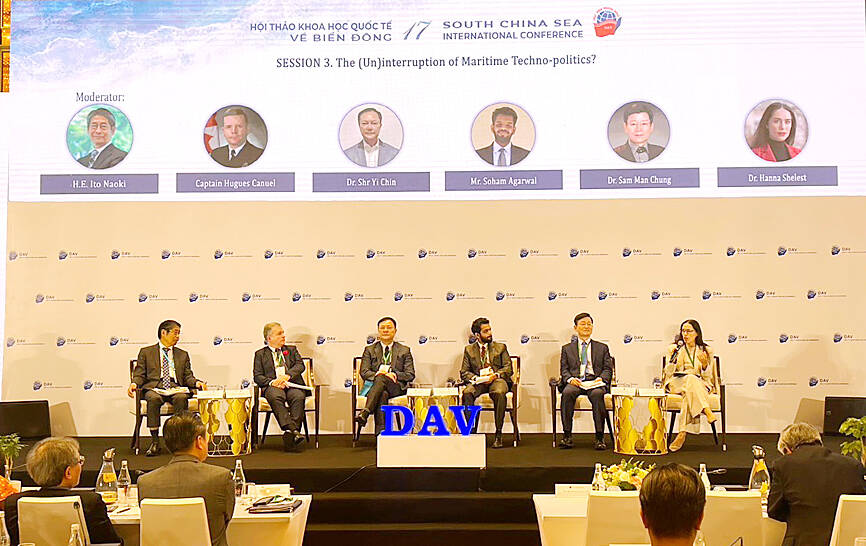Participants at the 17th South China Sea Conference held in Da Nang, Vietnam, called on ASEAN to reduce its reliance on China, advance the globalization and institutionalization of the South China Sea issue, and support a global effort to maintain regional safety and stability.
The annual event, hosted by the Hanoi-based Diplomatic Academy of Vietnam on Monday and Tuesday, brought together policymakers, national defense officials and security policy experts from 40 countries.
Philippine Coast Guard Commodore Jay Tarriela said that other nations could take a page from how Taipei and Manila resolved their differences over a deadly incident in 2013 and signed the Agreement Concerning the Facilitation of Cooperation on Law Enforcement in Fisheries Matters in 2015.

Photo coutesy of Jin Shi-yi via CNA
On May 9, 2013, a Philippine Coast Guard vessel opened fire on a Pingtung County-based Taiwanese fishing boat, killing 65-year-old fisherman Hung Shih-cheng (洪石成) and injuring crew members.
German Ambassador to Vietnam Helga Margarete Barth quoted German Minister of Foreign Affairs Johann Wadephul as saying that “China’s increasingly aggressive behavior in the Taiwan Strait, and the East and South China seas also has implications for us in Europe. Fundamental principles of our global coexistence are at stake here.”
The standards for actions in the South China Sea should not be determined solely by China and ASEAN, and countries in other regions with interests in the sea should also devote more attention to the ASEAN Regional Forum and related activities, EU Ambassador to Vietnam Julien Guerrier said.
The international community must stand together to ensure that those who observe international law are rewarded, and those who contravene it are punished, Guerrier said.
Europe’s overreliance on Russia, the US and China should be a lesson for ASEAN, Guerrier said, adding that the bloc should develop strategic and economic autonomy.
National Taiwan University professor Jin Shi-yi (金士懿) said during the “(Un)interruption of Maritime Techno-politics” section of the forum that uncrewed platforms would redefine the future of scientific monitoring, search and rescue operations, maritime patrols and national defense.
However, the development of such systems also challenges existing international legal frameworks, Jin said.
Taiwan’s strength in artificial intelligence and semiconductor chip manufacturing, and its adherence to international law, show that it can contribute significantly to achieving the sustainable ocean goal, and to fostering peace and prosperity in the region, he said.
National Cheng Kung University academic Kuo Cheng-yuan (郭正元) presented research he conducted with Chen Tzong-yueh (陳宗嶽) on how the algae-bacterial symbiotic system helped sustain maritime biodiversity, and what challenges the Taiwanese and Vietnamese marine production sectors face when attempting to strike a balance between production and maintaining the ecosystem.
Taiwan has great technical innovation, and is among the leading nations in automation, biotech and renewable energy management, Kuo said.
The nation can play a key role in regional collaboration and maritime technology innovation, he added.

Three Taiwanese airlines have prohibited passengers from packing Bluetooth earbuds and their charger cases in checked luggage. EVA Air and Uni Air said that Bluetooth earbuds and charger cases are categorized as portable electronic devices, which should be switched off if they are placed in checked luggage based on international aviation safety regulations. They must not be in standby or sleep mode. However, as charging would continue when earbuds are placed in the charger cases, which would contravene international aviation regulations, their cases must be carried as hand luggage, they said. Tigerair Taiwan said that earbud charger cases are equipped

Foreign travelers entering Taiwan on a short layover via Taiwan Taoyuan International Airport are receiving NT$600 gift vouchers from yesterday, the Tourism Administration said, adding that it hopes the incentive would boost tourism consumption at the airport. The program, which allows travelers holding non-Taiwan passports who enter the country during a layover of up to 24 hours to claim a voucher, aims to promote attractions at the airport, the agency said in a statement on Friday. To participate, travelers must sign up on the campaign Web site, the agency said. They can then present their passport and boarding pass for their connecting international

Taiwan sweltered through its hottest October on record, the Central Weather Administration (CWA) said yesterday, the latest in a string of global temperature records. The main island endured its highest average temperature since 1950, CWA forecaster Liu Pei-teng said. Temperatures the world over have soared in recent years as human-induced climate change contributes to ever more erratic weather patterns. Taiwan’s average temperature was 27.381°C as of Thursday, Liu said. Liu said the average could slip 0.1°C by the end of yesterday, but it would still be higher than the previous record of 27.009°C in 2016. "The temperature only started lowering around Oct. 18 or 19

WEATHER Typhoon forming: CWA A tropical depression is expected to form into a typhoon as early as today, the Central Weather Administration (CWA) said yesterday, adding that the storm’s path remains uncertain. Before the weekend, it would move toward the Philippines, the agency said. Some time around Monday next week, it might reach a turning point, either veering north toward waters east of Taiwan or continuing westward across the Philippines, the CWA said. Meanwhile, the eye of Typhoon Kalmaegi was 1,310km south-southeast of Oluanpi (鵝鑾鼻), Taiwan’s southernmost point, as of 2am yesterday, it said. The storm is forecast to move through central